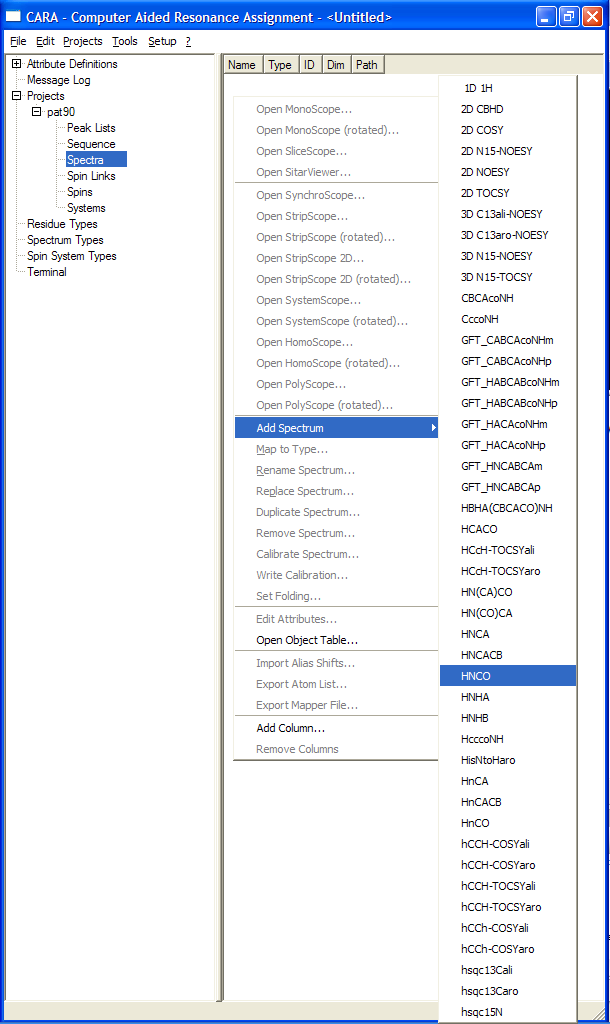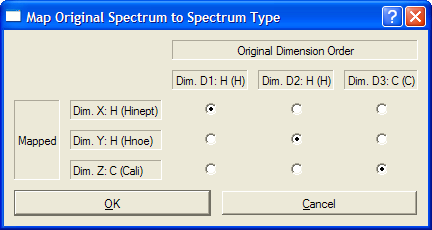Loading NMR Spectra in CARA: Difference between revisions
No edit summary |
m (moved Load ing NMR Spectra in CARA to Loading NMR Spectra in CARA) |
||
| (2 intermediate revisions by the same user not shown) | |||
| Line 1: | Line 1: | ||
=== === | |||
The next thing you have to do is to start loading NMR spectra of your protein into the repository. Usually you start with 2D 15N HSQC, 3D triple-resonance spectra, to be able to start working on assignment. You can add side-chain experiments like HCCH-COSY and 3D NOESYs later. | The next thing you have to do is to start loading NMR spectra of your protein into the repository. Usually you start with 2D 15N HSQC, 3D triple-resonance spectra, to be able to start working on assignment. You can add side-chain experiments like HCCH-COSY and 3D NOESYs later. | ||
CARA does not store frequency-domain data in the repository due to their large size. Instead, it stores paths to the corresponding files. | CARA does not store frequency-domain data in the repository due to their large size. Instead, it stores paths to the corresponding files. | ||
It is recommended to keep the spectra files in the same folder. If you ever have to copy or move your spectra to a different location and try to open the repository, CARA would ask you to fix broken paths to the spectral files. Once you successfully provide the new path a spectrum, CARA will try to use it to read the remaining spectra. If all you spectra are in one place, you only need to give just one new path, not a dozen. | It is recommended to keep the spectra files in the same folder. If you ever have to copy or move your spectra to a different location and try to open the repository, CARA would ask you to fix broken paths to the spectral files. Once you successfully provide the new path a spectrum, CARA will try to use it to read the remaining spectra. If all you spectra are in one place, you only need to give just one new path, not a dozen. | ||
Though CARA can handle several file formats, we assume that you are dealing with XEASY spectra. | Though CARA can handle several file formats, we assume that you are dealing with XEASY spectra. | ||
To open a spectrum, left click on the Spectra tab in your project, then right-click on the right panel. When a context menu pops up, point to Add spectrum and select the appropriate spectrum type (e.g. HNCO) from the menu. | To open a spectrum, left click on the Spectra tab in your project, then right-click on the right panel. When a context menu pops up, point to Add spectrum and select the appropriate spectrum type (e.g. HNCO) from the menu. | ||
Most common spectra types are defined in the template. If you have some exotic spectrum you can create your own spectrum type definition as described here: [http://www.cara.ethz.ch/Wiki/CreateSpectrumType http://www.cara.ethz.ch/Wiki/CreateSpectrumType] | Most common spectra types are defined in the template. If you have some exotic spectrum you can create your own spectrum type definition as described here: [http://www.cara.ethz.ch/Wiki/CreateSpectrumType http://www.cara.ethz.ch/Wiki/CreateSpectrumType] | ||
* Loading a spectrum:<br> | | ||
*Loading a spectrum:<br> [[File:CARA_load_spectrum.png]] | |||
Note that there are distinct definitions for aliphatic and aromatic types of 2D 13C HSQC, 3D 13C-resolved NOESY, and HCCH spectra. It prevents these two carbon regions from folding onto each other. | Note that there are distinct definitions for aliphatic and aromatic types of 2D 13C HSQC, 3D 13C-resolved NOESY, and HCCH spectra. It prevents these two carbon regions from folding onto each other. | ||
Spectral dimensions do not have to be in a certain order in the spectral file for CARA to display spectra correctly. When loading a spectrum you will have a chance to provide the proper orientation. | Spectral dimensions do not have to be in a certain order in the spectral file for CARA to display spectra correctly. When loading a spectrum you will have a chance to provide the proper orientation. | ||
* Set orientation:<br> | | ||
*Set orientation:<br> [[File:CARA_map_to_spectrum_type.png]] | |||
For CARA it is important to know, which nucleus corresponds to each dimension in a spectrum. Usually CARA makes a decision on its own, based on the ppm range of the dimension. Still, 15N and 13C carbonyl, and methyl 13C and 1H can often be confused. A standard solution to this problem is to make sure there are proper Identifier for dimension wX lines in Xeasy *.3D.param files prior to loading, as in this example of a 3D HNCO spectrum: | For CARA it is important to know, which nucleus corresponds to each dimension in a spectrum. Usually CARA makes a decision on its own, based on the ppm range of the dimension. Still, 15N and 13C carbonyl, and methyl 13C and 1H can often be confused. A standard solution to this problem is to make sure there are proper Identifier for dimension wX lines in Xeasy *.3D.param files prior to loading, as in this example of a 3D HNCO spectrum: | ||
<pre>Version ....................... 1 | |||
Number of dimensions .......... 3 | |||
16 or 8 bit file type ......... 16 | |||
Spectrometer frequency in w1 .. 60.7413 | |||
Spectrometer frequency in w2 .. 150.7300 | |||
Spectrometer frequency in w3 .. 599.4460 | |||
Spectral sweep width in w1 .... 27.6576 | |||
Spectral sweep width in w2 .... 15.9225 | |||
Spectral sweep width in w3 .... 8.3410 | |||
Maximum chemical shift in w1 .. 131.7220 | |||
Maximum chemical shift in w2 .. 185.6120 | |||
Maximum chemical shift in w3 .. 13.1120 | |||
Size of spectrum in w1 ........ 128 | |||
Size of spectrum in w2 ........ 256 | |||
Size of spectrum in w3 ........ 512 | |||
Submatrix size in w1 .......... 16 | |||
Submatrix size in w2 .......... 32 | |||
Submatrix size in w3 .......... 64 | |||
Permutation for w1 ............ 3 | |||
Permutation for w2 ............ 2 | |||
Permutation for w3 ............ 1 | |||
Folding in w1 ................. RSH | |||
Folding in w2 ................. RSH | |||
Folding in w3 ................. RSH | |||
Type of spectrum .............. ? | |||
Identifier for dimension w1 ... N | |||
Identifier for dimension w2 ... C | |||
Identifier for dimension w3 ... H | |||
< | </pre> | ||
-- Main.AlexEletski - 07 Mar 2007 | |||
[[Category:CARA]][[Category:Resonance Assignment]] | |||
Latest revision as of 20:25, 6 November 2009
The next thing you have to do is to start loading NMR spectra of your protein into the repository. Usually you start with 2D 15N HSQC, 3D triple-resonance spectra, to be able to start working on assignment. You can add side-chain experiments like HCCH-COSY and 3D NOESYs later.
CARA does not store frequency-domain data in the repository due to their large size. Instead, it stores paths to the corresponding files.
It is recommended to keep the spectra files in the same folder. If you ever have to copy or move your spectra to a different location and try to open the repository, CARA would ask you to fix broken paths to the spectral files. Once you successfully provide the new path a spectrum, CARA will try to use it to read the remaining spectra. If all you spectra are in one place, you only need to give just one new path, not a dozen.
Though CARA can handle several file formats, we assume that you are dealing with XEASY spectra.
To open a spectrum, left click on the Spectra tab in your project, then right-click on the right panel. When a context menu pops up, point to Add spectrum and select the appropriate spectrum type (e.g. HNCO) from the menu.
Most common spectra types are defined in the template. If you have some exotic spectrum you can create your own spectrum type definition as described here: http://www.cara.ethz.ch/Wiki/CreateSpectrumType
Note that there are distinct definitions for aliphatic and aromatic types of 2D 13C HSQC, 3D 13C-resolved NOESY, and HCCH spectra. It prevents these two carbon regions from folding onto each other.
Spectral dimensions do not have to be in a certain order in the spectral file for CARA to display spectra correctly. When loading a spectrum you will have a chance to provide the proper orientation.
For CARA it is important to know, which nucleus corresponds to each dimension in a spectrum. Usually CARA makes a decision on its own, based on the ppm range of the dimension. Still, 15N and 13C carbonyl, and methyl 13C and 1H can often be confused. A standard solution to this problem is to make sure there are proper Identifier for dimension wX lines in Xeasy *.3D.param files prior to loading, as in this example of a 3D HNCO spectrum:
Version ....................... 1 Number of dimensions .......... 3 16 or 8 bit file type ......... 16 Spectrometer frequency in w1 .. 60.7413 Spectrometer frequency in w2 .. 150.7300 Spectrometer frequency in w3 .. 599.4460 Spectral sweep width in w1 .... 27.6576 Spectral sweep width in w2 .... 15.9225 Spectral sweep width in w3 .... 8.3410 Maximum chemical shift in w1 .. 131.7220 Maximum chemical shift in w2 .. 185.6120 Maximum chemical shift in w3 .. 13.1120 Size of spectrum in w1 ........ 128 Size of spectrum in w2 ........ 256 Size of spectrum in w3 ........ 512 Submatrix size in w1 .......... 16 Submatrix size in w2 .......... 32 Submatrix size in w3 .......... 64 Permutation for w1 ............ 3 Permutation for w2 ............ 2 Permutation for w3 ............ 1 Folding in w1 ................. RSH Folding in w2 ................. RSH Folding in w3 ................. RSH Type of spectrum .............. ? Identifier for dimension w1 ... N Identifier for dimension w2 ... C Identifier for dimension w3 ... H
-- Main.AlexEletski - 07 Mar 2007

